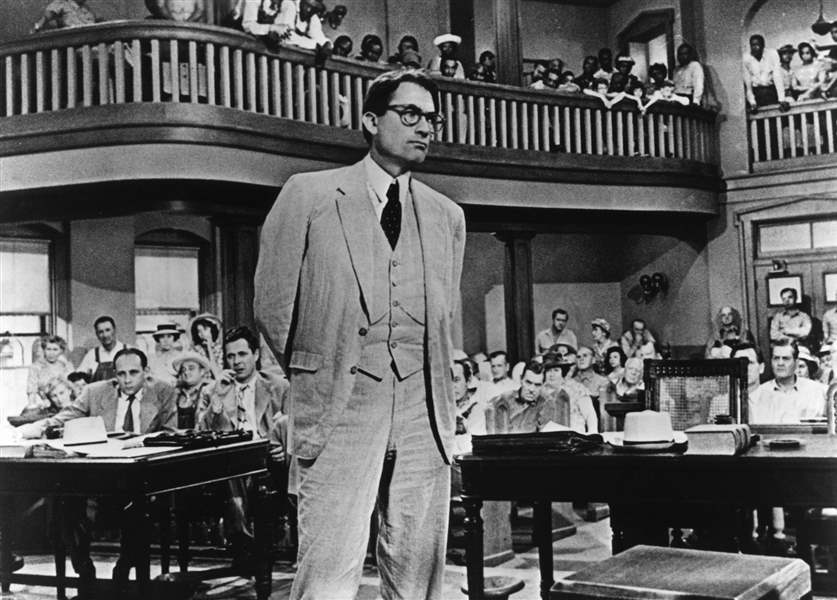
FREE SPEECH FOR THEE?
Banning books deprives students of complex discussion
11/10/2017
Atticus Finch of "To Kill A Mockingbird," portrayed here by Gregory Peck in the 1962 adaptation, is the type of character all should read about, not have hidden away from them.
Associated Press
“What exactly is a n----- lover?” Scout asks her father, Atticus Finch, in Harper Lee’s Pulitzer Prize-winning novel “To Kill A Mockingbird.”
“Ignorant, trashy people use it when they think somebody’s favoring Negroes over and above themselves,” he tells Scout. “It’s slipped into usage with some people like ourselves, when they want a common, ugly term to label somebody.”
It is this kind of clear and decisive anti-racist rhetoric that has made “Mockingbird” one of the America’s most celebrated novels — and one of its most censored.
VIDEO: American Library Association’s Top Ten Challenged Books of 2016
Race relations remain a central and difficult issue in this country. Recent events in Ferguson, Baltimore, and beyond have demonstrated this point. Attempts to remove a book like “Mockingbird” from the curriculums of schools is not only an affront to free speech, but it exacerbates the problem Americans continue to have with race relations.
Set during the Depression in a small Alabama town, “To Kill A Mockingbird” contains vivid depictions of racism and discrimination, including racial slurs. The book’s central character, small-town lawyer Atticus Finch, decides to defend Tom Robinson, a black man accused of rape.
At the time of the book’s publication in 1960, the themes of the book were highly controversial. The South remained highly segregated, but the civil rights movement was waging what would prove to be an effective campaign to guarantee the rights of African-Americans. University of Northern Iowa professors Theodore and Grace Ann Hovet observed that “‘To Kill A Mockingbird’ was written and published amidst the most significant and conflict-ridden social change in the South since the Civil War and Reconstruction.”
While the book’s use of racial slurs has made it the target of censors in the 21st century — including a recent attempt to remove it from the eighth grade curriculum in Biloxi, Miss. — it was initially the novel’s rebuke of racist ideals that made it one of the country’s most censored books.
By focusing on the book’s uncensored and admittedly disconcerting language, however, school administrators have elected to protect students from difficult but essential conversations in favor of comfort.
“There is some language in the book that makes people uncomfortable, and we can teach the same lesson with other books,” Kenny Holloway, the vice president of the Biloxi School Board, told the Sun Herald. “It’s still in our library. But they’re going to use another book in the eighth-grade course.”
But uncomfortable confrontations with difficult topics is a large part of what education ought to be about. Shying away from the unsettling language of “To Kill A Mockingbird” takes the learning process in the wrong direction, steering it away from hard truths in favor of false comforts.
Eighth graders are many things, but most of them are by that point in their lives not naïve about the language that people use or the ideas behind their words. Most of them have encountered the n-word and a host of other offensive words.
But what might help them to understand the power of such words and from using them in a hurtful way is a classroom discussion not unlike the one Scout has with Atticus. Why do people use these words? Why should we not use them?
After Biloxi School Board’s attempt to remove “Mockingbird” from its curriculum, the ACLU of Mississippi issued a statement criticizing the move as both a violation of the First Amendment, but as a disservice to the advancement of critical discussion.
“We believe in an educated citizenry,” the organization wrote. “We believe in a society where ideas are openly disseminated, discussed, and debated. We believe that the right to disagree is fundamental to our democracy, and that our country and communities function best when citizens exercise their right to read, learn, and explore the world around them.”
Read last week’s ‘Free Speech For Thee?’ column
Biloxi seems to have received the message. The ensuing outcry was so extreme that the Biloxi School Board acquiesced and allowed the book to return to its eighth-grade reading list — though students may only read it with a parent’s permission.
In its “Freedom to Read Statement,” the American Library Association offered a pointed explanation for why all people deserve unfettered access to literature.
“The freedom to read is essential to our democracy,” the ALA proclaimed. “We realize that the application of these propositions may mean the dissemination of ideas and manners of expression that are repugnant to many persons. We do not state these propositions in the comfortable belief that what people read is unimportant. We believe rather that what people read is deeply important; that ideas can be dangerous; but that the suppression of ideas is fatal to a democratic society. Freedom itself is a dangerous way of life, but it is ours.”
Do public schools possess the authority to decide what books to include in or exclude from the curriculum and/or the school’s library? It has been a regularly disputed issue since 1982, when the Supreme Court set forth its ultimately inconclusive opinions in the case of Island Trees School District v. Pico.
But banning books — whether motivated by social change or, to borrow from the late Justice William Brennan, the desire to “prescribe what shall be orthodox in politics, nationalism, religion, or other matters of opinion” — is detrimental to both the quality of education and the integrity of the First Amendment.
In the end, it is simple. Without access to books of all kinds, but particularly ones with vital messages like those presented in “To Kill A Mockingbird,” our country and our citizens will be destined to repeat the same mistakes over and over.
Contact Will Tomer at wtomer@theblade.com, 419-724-6404, or on Twitter @WillTomer.